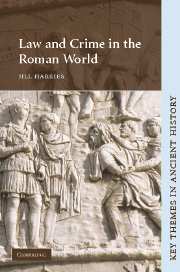Book contents
- Frontmatter
- Contents
- Preface
- 1 Competing discourses
- 2 Public process and the legal tradition
- 3 Cognitio
- 4 The thief in the night
- 5 Controlling elites I: ambitus and repetundae
- 6 Controlling elites II: maiestas
- 7 Sex and the City
- 8 Remedies for violence
- 9 Representations of murder
- Bibliographical essay
- References
- Index
8 - Remedies for violence
Published online by Cambridge University Press: 05 June 2012
- Frontmatter
- Contents
- Preface
- 1 Competing discourses
- 2 Public process and the legal tradition
- 3 Cognitio
- 4 The thief in the night
- 5 Controlling elites I: ambitus and repetundae
- 6 Controlling elites II: maiestas
- 7 Sex and the City
- 8 Remedies for violence
- 9 Representations of murder
- Bibliographical essay
- References
- Index
Summary
To legislate against violence was to seek to inhibit forms of behaviour endemic to Roman culture. Self-help through direct physical and frequently violent action was both socially and legally recognised (Nippel 1995: 35–9). The Roman state was founded on the fratricide of Remus by Romulus, the successful ‘founder’, who added to his achievement the perpetuation of his city's population through the rape of the Sabine women. Roman military conquest was accompanied by mass murder, brazenly publicised: Caesar boasted of having killed over a million Gauls (Pliny, Natural History 7.92). The suffering of the vanquished was displayed on public monuments, paralleling the agonies of criminals in the amphitheatre, where painful and protracted death became entertainment, reassuring Romans of their own place in the world (M. Zimmerman 2006: 347; Coleman 1990, 1998). Physical violence and, with it, violent self-help were an institutionalised part of Roman society.
Early civil procedures made it the responsibility of the plaintiff to produce the defendant in court, by physical means such as grasping him by the hand (manus iniectio) if necessary (RSii, 584–90). As we have seen, the law recognised the right of the citizen to kill in certain situations, in defence of property or honour. The thief who came by night could be killed by the householder in self-defence; the offender against family honour could be subjected to the summary justice of the paterfamilias and the family council. The jurisdiction of the family also extended into the public sphere.
- Type
- Chapter
- Information
- Law and Crime in the Roman World , pp. 106 - 117Publisher: Cambridge University PressPrint publication year: 2007



